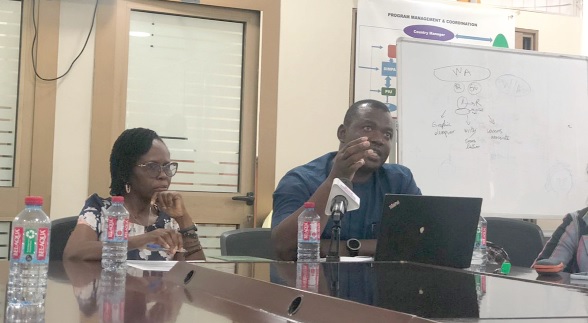A policy Officer at AGRA, Dr Dorothy Effa, is calling for the establishment of an agricultural insurance fund to provide insurance cover for the country’s farmers.
At a time when farmers are still struggling to find the needed support to scale up their production, such a fund, she believes, would help them access loans from banks to boost their operations.
She pointed to study reports which indicated that financial institutions only devoted six per cent of their total loan portfolio to agriculture, citing financial risks associated with crop failures due to natural disasters, pests, diseases or adverse weather conditions as part of the reason for their action.
Much as she did not indicate how money for the fund would be raised, Dr Effa was optimistic that when insured, farmers could receive compensation for their losses, allow them to recover and continue their farming activities without suffering severe financial setbacks in the case of any eventuality.
It would also position them to pay back loans taken.
Agric sector at a glance
Reports over the years have pointed to the fact that agriculture remains an important but declining sector of the Ghanaian economy.
For instance a 2019 estimate by the World Bank put its contribution to the labour force at 30 per cent, down from 51 per cent in 2009.
Its contribution to gross domestic product (GDP) is similarly declining.
An Oxford Business Group report which examined the sector in 2020 said that over the last decade, the sector’s contribution to national growth more than halved.
In 2009, it amounted to 32 per cent of nominal GDP but went down to 15 per cent as of the second quarter of 2019.
The sector has great potential for growth, given Ghana’s growing population for domestic consumption and the establishment of the African Continental Free Trade Area for exports, experts say, but limited access to finance to buy modern equipment, chemicals and seedlings have all held back sector growth.
Investment opportunity
In an interview with the media on the sidelines of a press soiree in Accra, Dr Effa said the availability of agricultural insurance would not only attract investors but enable farmers to become less vulnerable to the uncertainties of weather and other uncontrollable factors and help increase productivity.
The event was to brief the media on AGRA’s upcoming Africa Food Systems Forum, as well as discuss its new strategy aimed at transforming Ghana’s food systems through agro-processing.
“It is very critical, if we want to improve our agriculture in the country, because without an agricultural insurance fund farmers are finding it difficult to get loans from financial institutions because of the high risks in agriculture such as fire outbreak, flood and pest infestation.”
“Farmers can lose everything which would make it difficult for them to pay back their loans.
That is why some banks are not interested in giving loans to farmers.
But if they are given an assurance that there is insurance no matter the risks involved, banks give out loans because they will be able to get their money back,” she said.
She further said the National Insurance Act was amended in 2021 to include agriculture insurance, because that was not captured in it.
According to her, insurance agencies were not interested because there was no law backing them.
“That is why AGRA worked with the Ghana Insurance Commission to amend the Act and include Agricultural insurance and in the act, they specified clearly that there should be an establishment of an agriculture insurance fund because agriculture insurance is very expensive,” she said.
“Therefore, there is an urgent need for a fund that can subsidise and provide insurance for farmers,” she added.
Africa Food System
The Country Manager of AGRA Ghana, Juliette Lampoh–Agroh, said over the years, AGRA has been working with the government to support an inclusive transformation of agriculture where there is an increase in human capacity and productivity in the country.
She said the Africa Food Systems Forum happening in Tanzania between September 5 and 8 on the theme; “Recover, Regenerate, Act: Africa’s Solutions to Food Systems Transformation,” will provide an opportunity to take forward the momentum that AGRA is building in the food system transformation conversation.
“We want to be able to see that that momentum is kept. I expect the commitments that have been made for Ghana’s food system transformation to be moving to more action.
In Ghana we have already developed a food systems investment plan and I am looking for investors to come into that programme and making a commitment towards them to support our agenda to transform our agriculture food systems,” she said.
